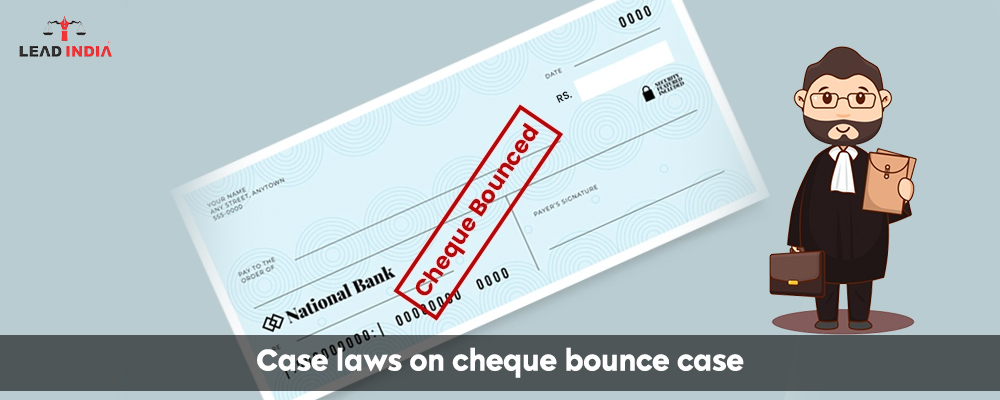The law pertaining to cheques being dishonoured is known as the Negotiable Instrument Act, of 1881, or N.I. Act. A bill of exchange drawn on a designated banker and payable on demand is what the Act defines as a “cheque” for the purposes of Section 6.
Section 138 of NI Act 1881 states that dishonouring cheques carries a two-year maximum sentence in prison if the endorsement shows insufficient funds.
Need A Legal Advice
The internet is not a lawyer and neither are you. Talk to a real lawyer about your legal issue

Cheque bounce case: Overview
- The Negotiable Instruments Act, 1881 (“Act”), Section 138, declares that a cheque bounce is a crime. You risk a fine of up to twice the amount on the cheque, up to two years in jail, or both.
- When a payee delivers a cheque to the bank for clearance and the bank returns it with a memo indicating that the account does not have enough funds, the cheque is considered bounced.
Cheque bounce case: Reasons
The reasons for a Cheque bounce case are as follows:
- If the amount on the cheque, the drawer’s signature, or any other statement has been changed, the cheque bounces because of overwriting.
- When a business prints a cheque without adding the seal of the company.
- The account number is not correct.
- When both signatures are required for a joint account cheque, there is only one sign.
- If a cheque is stained, damaged, or has lost its writing, it will bounce.
- It has been over three months since the cheque was given out.
- If the account was closed
- If the account’s balance is insufficient.
Role of Lawyers in Cheque Bounce Case
A “bounced cheque” is a cheque that gets rejected unpaid by the recipient bank for any of the listed reasons. Cheque Bouncing or dishonouring a cheque is an extremely serious crime that carries a fine, an imprisonment sentence, or both, according to Section 138 of the Negotiable Instruments Act 1881.
A skilled lawyer will help you with the following:
- creating a plan of action;
- creating a guide for case preparation;
- filing and distributing notices on time;
- preparing documents; and
- participating in trials and hearings.
Case Laws on Cheque Bounce Case
An individual should know and have knowledge of the case laws on cheque bounce cases. The case laws on cheque bounce cases can work as a precedent for them to know what possible outcomes can they get in a cheque bounce case.
- In the case of Kusum Ingots & Alloys Ltd. v Pennar Peterson Securities Ltd (2000), the Supreme Court of India ruled that the provisions of Section 138 of the NI Act do not apply to a cheque written as a gift or for any other purpose that does not result in a legally enforceable debt or liability.
- In the case of MMTC Ltd. v Medchl Chemicals & Pharma P Ltd. (2002), according to the ruling of the Supreme Court of India, if the notice under Section 138 of the NI Act is not served within 30 days of the bank informing you that the cheque has been dishonoured, the complaint will be deemed invalid.
- In the case of Sadanandan Bhadran v Madhavan Sunil Kumar (2011), the Kerala High Court ruled that, absent a legally enforceable debt or liability, a cheque provided as there will be no application of Section 138 of the NI Act to the security deposit.
- In the case of ANNS Rajshekhar v Augustus Jeba Ananth (2019), for the purposes of Section 138, the Supreme Court noted that the presumption according to Section 139 of the NI Act is rebuttable on the basis of the existence of a legally enforceable debt. The proportionality test will be used to refute the assumption.
- In the case of Ravi Dixit v State of UP & Anr (2020), based on the drawer’s response to the payment notice, it was evident what their intention was. The Court determined that while the purpose of Section 138’s proviso is to postpone the prosecution of an offense, this does not preclude the prosecution of the same when the drawer’s intention to avoid liability is obvious.
New Guidelines issued by Supreme Court with Bench of Justice in NI Act Cases
- Based on Section 138 of The Negotiable Instrument Act, the Supreme Court of India’s decision in cheque bounce cases stipulates that the issuer of a bounced cheque can only be found guilty if they intended to deceive when they issued the cheque.
- This decision will have a substantial influence on associated civil and criminal procedures and clarify the legal ramifications of writing a bounced cheque.
For any type of legal assistance, one can talk to lawyer from Lead India. Lead India provides free online legal advice in India. With Lead India, one can ask free online questions of the experts in addition to getting free legal advice.





 Talk to a Lawyer
Talk to a Lawyer